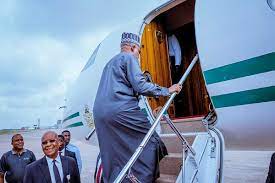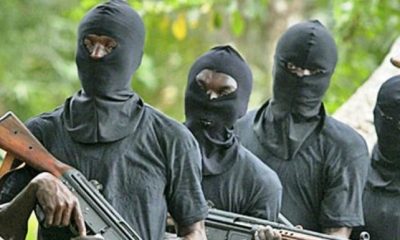Foreign News
U.S. Threatens Action Against Detainers of Myanmar’s President

The U.S. has threatened to take action against those responsible for the detention of State Counsellor Aung San Suu Kyi, as well as President Win Myint in Myanmar.
“The United States is alarmed by reports that the Burmese military has taken steps to undermine the country’s democratic transition, including the arrest of State Counselor Aung San Suu Kyi and other civilian officials in Burma (Myanmar).
“President (Joe) Biden has been briefed by National Security Advisor Jake Sullivan,” White House Spokesperson Jen Psaki said in a statement.Earlier, Western media reported that Aung San Suu Kyi and President Win Myint were detained along with other members of Myanmar’s ruling party in an early morning military raid on Monday.
“We continue to affirm our strong support for Burma’s democratic institutions and, in coordination with our regional partners, urge the military and all other parties to adhere to democratic norms and the rule of law, and to release those detained today.“The United States opposes any attempt to alter the outcome of recent elections or impede Myanmar’s democratic transition, and will take action against those responsible if these steps are not reversed,” Psaki said.
The U.S. State Department has also expressed concerns over the detention of multiple civilian government leaders in Myanmar.
“We call on Burmese military leaders to release all government officials and civil society leaders and respect the will of the people of Burma as expressed in democratic elections on Nov. 8.“The United States stands with the people of Burma in their aspirations for democracy, freedom, peace, and development.“The military must reverse these actions immediately,” the State Department said in a statement.
The Australian government has also issued a statement on Myanmar, saying that Australia is a long-standing supporter of Myanmar and its democratic transition.
“We call on the military to respect the rule of law, to resolve disputes through lawful mechanisms, and to release immediately all civilian leaders and others who have been detained unlawfully,” Australia’s foreign ministry said in a Monday statement.
Later in the morning, UK Prime Minister Boris Johnson joined international leaders in condemning the actions of Myanmar’s military.
“I condemn the coup and unlawful imprisonment of civilians, including Aung San Suu Kyi, in Myanmar.“The vote of the people must be respected and civilian leaders released,” Johnson wrote on Twitter.
According to media reports, Myanmar’s military announced a state of emergency on Monday morning, in a declaration signed by First Vice President Win Myint Swe, who will now be serving as Myanmar’s acting president.According to the declaration, state power is being handed over to Commander-in-Chief of Defense Services Min Aung Hlaing.The announcement came after Myanmar’s government leaders and members of the ruling National League for Democracy party were detained.
In January, Myanmar’s military raised the prospect of a coup d’etat after what they believed was widespread voter fraud during the November 8 election, which was the country’s second general election since the end of military rule in 2011. (Sputnik/NAN)
Foreign News
Thousands Protest in Pakistan After Drone Strike Kills 4 Children

Thousands of people in north-west Pakistan on Tuesday blocked a highway by placing the coffins of four children who were killed by a suspected drone strike.
The protests in the Mir Ali area of North Waziristan region began earlier on Monday after a family home was hit, local resident Mohamed Jamal Dawar said.
It is not clear who was behind the incident.
Local activist Zahid Wazir said the drone was operated by the Pakistani military.
He said the home was likely mistaken as a hideout used by Islamist militants.
Pakistani intelligence officials said the explosives were fired by a quadcopter that was being operated by the Taliban militants to target a nearby military post, but that it missed the target.
An independent verification was not possible as the region is inaccessible to outsiders.
Activists of a local rights group, the Pashtun Tahafuz Movement, which is against the militarisation of the region by both the military and the Pakistani Taliban, vowed to continue the protest.
“We will continue to demand justice for our kids,” Wazir said.
The Pakistani military and Islamist militants have been fighting each other in the region for more than two decades.
More than 80,000 Pakistanis, an overwhelming majority of civilians, have lost their lives in years of violence. (dpa/NAN)
Foreign News
Man Executed in Indiana For Killing Police Officer

Benjamin Ritchie, 45, had been on Indiana’s death row since 2002, when he was convicted of killing Beech Grove Police Officer Bill Toney during a chase on foot.
Benjamin Ritchie, 45, had been on Indiana’s death row since 2002, when he was convicted of killing Beech Grove Police Officer Bill Toney during a chase on foot.
Ritchie was executed at the Indiana State Prison in Michigan City, according to Indiana Department of Correction officials.
IDOC said in a statement that the process started shortly after midnight and Ritchie was pronounced dead at 12:46 a.m.
Ritchie’s last meal was from the Olive Garden and he expressed love, support and peace for his friends and family, according to the statement.
Under state law, he was allowed five witnesses at his execution, which included his attorney Steve Schutte, who told reporters he had a limited view of the process.
“I couldn’t see his face. He was lying flat by that time,” Schutte said. “He sat up, twitched, laid back down.”
The process was carried out hours after the U.S. Supreme Court declined to take the case, exhausting all of Ritchie’s legal options to fight the death sentence.
Dozens of people, both anti-death penalty advocates and supporters of Toney, stood outside the prison until early Tuesday.
Indiana resumed executions in December after a year’s long hiatus due to a scarcity of lethal injection drugs nationwide.
Prison officials provided photos of the execution chamber before Joseph Corcoran’s execution, showing a space that looks like an operating room with a gurney, fluorescent lighting and an adjacent viewing room.
They’ve since offered few other details.
Among the 27 states with death penalty laws, Indiana is one of two that bars media witnesses.
The other, Wyoming, has conducted one execution in the last half-century.
The Associated Press and other media organisations filed a federal lawsuit in Indiana seeking media access, but a federal judge denied a preliminary injunction last week that would have allowed journalists to witness Ritchie’s execution and future ones.
The judge found that barring the news media doesn’t violate the First Amendment nor does it single out the news media for unequal treatment.
The execution in Indiana is among 12 scheduled in eight states this year.
Ritchie’s execution and two others in Texas and Tennessee will be carried out this week.
Ritchie was 20 when he and others stole a van in Beech Grove, near Indianapolis.
He then fired at Toney during a foot chase, killing him.
At the time Ritchie was on probation from a 1998 burglary conviction.
Toney, 31, had worked at the Beech Grove Police Department for two years.
The married father of two was the first officer of the small department to be killed by gunfire in the line of duty. (AP/NAN)
Foreign News
WHO Member States Adopt New Pandemic Treaty

Member states of the World Health Organisation (WHO) on Tuesday adopted a new pandemic treaty aimed at avoiding the panic and disarray seen during the COVID-19 crisis.
The agreement was accepted without a formal vote on the second day of the members’ annual World Health Assembly in Geneva.
As the conference chair asked whether there were any objections, silence followed, prompting him to declare the treaty adopted by consensus.
The treaty outlines measures for coordinated procurement of protective equipment during future pandemics, enhanced monitoring of diseases in both animals and humans.
There should also be the transfer of medical technology to ensure that medicines and vaccines can be produced in low-income countries.
However, several contentious details remain unresolved and are set to be negotiated separately over the next year as part of an annex to the treaty.
These include a new mechanism to accelerate vaccine production and ensure equitable distribution to poorer nations. (dpa/NAN)































